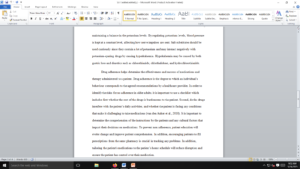Therapeutic drug
After studying Module 4: Lecture Materials & Resources, discuss the following:
- Therapeutic drug monitoring is a frequent practice in health care. How does age affect drug absorption, metabolization and excretion?
- The use of salt substitutes can cause hyperkalemia in older adults when use in conjunction with what types of drugs?
- Describe how you would prevent and evaluate risk factors for medication nonadherence in older adults?
Submission Instructions:
- Your initial post should be at least 500 words, formatted and cited in current APA style with support from at least 2 academic sources
Requirements: 500 words
Answer preview
maintaining a balance in the potassium levels. By regulating potassium levels, blood pressure is kept at a constant level, affecting how nerve impulses are sent. Salt substitutes should be used cautiously since they contain a lot of potassium and may interact negatively with potassium-sparing drugs by causing hyperkalaemia. Hypokalaemia may be caused by both gastric loss and diuretics such as chlorothiazide, chlorthalidone, and hydrochlorothiazide.
Drug adherence helps determine the effectiveness and success of medications and therapy administered to a patient. Drug adherence is the degree to which an individual’s behaviour corresponds to the agreed recommendations by a healthcare provider. In order to identify the risks for no adherence in older adults, it is important to use a checklist which includes first whether the cost of the drugs is burdensome to the patient. Second, do the drugs
[600 Words]

Therapeutic drug

